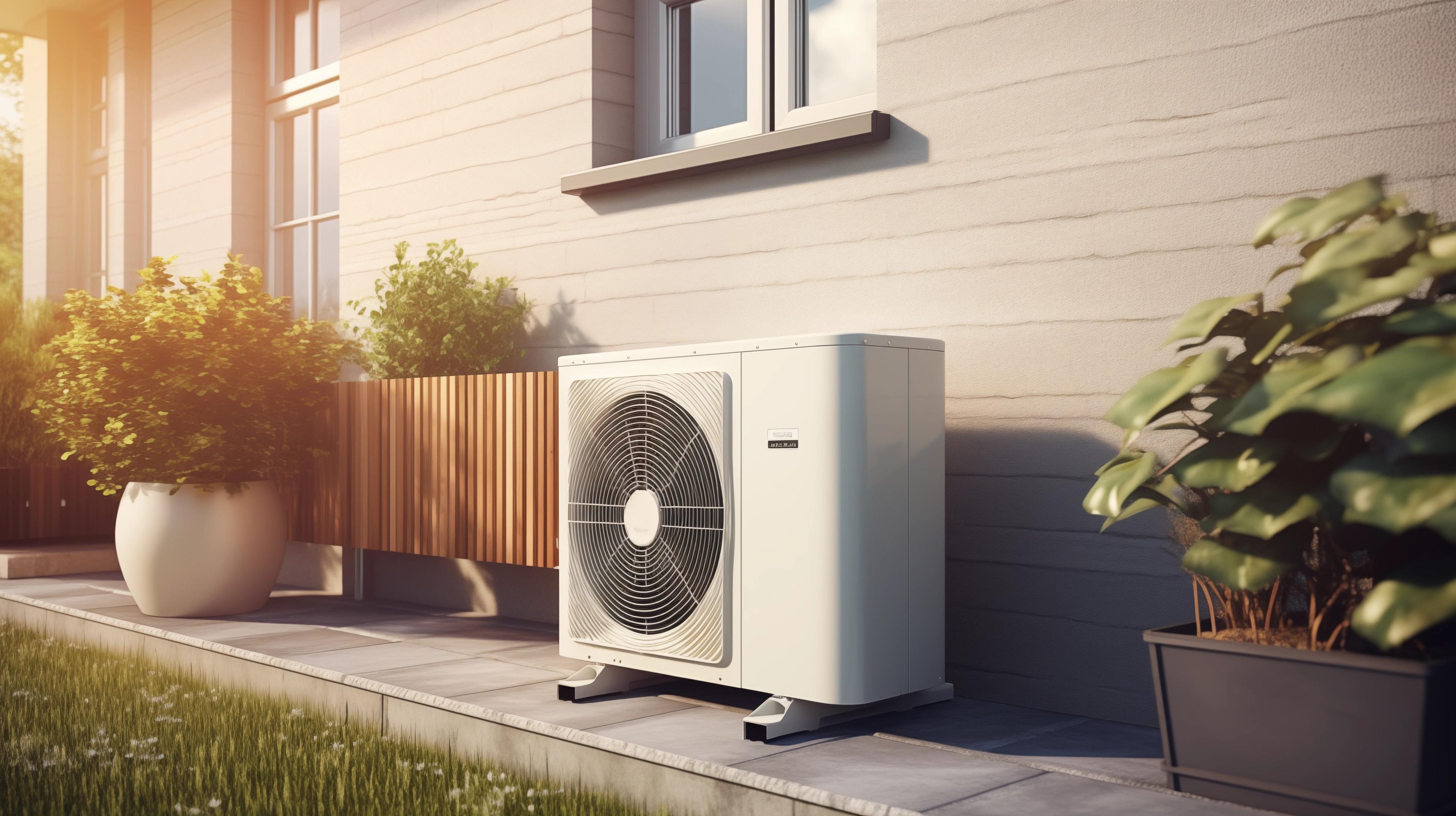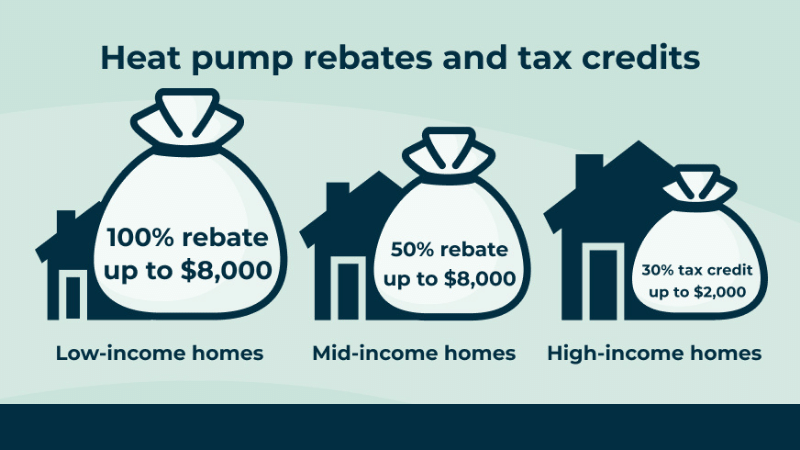The Inflation Reduction Act “Pumps Up” Heat Pumps

President Joe Biden signed the Inflation Reduction Act of 2022 (IRA) into law on August 16, 2022. The IRA aims to alleviate inflation, lower prescription drug prices, reduce the national deficit, and lower the country’s carbon emissions.
The largest ever federal legislation addressing climate change, the IRA invests $369 billion in clean energy sources and technologies that improve energy efficiency. Part of this includes offering significant rebates and tax incentives to homeowners who purchase heat pumps.
In fact, some Americans will be eligible for a free heat pump to cool and heat their home, while other homeowners will qualify for other rebates or tax credits.
As of July 2024, rebates are only available in New York but are expected to be accessible in other states later in 2024 or in 2025.
If you decide to purchase a heat pump, HVAC.com can deliver a comprehensive HVAC quote within 24 hours, giving you peace of mind to move forward with confidence.
What is a Heat Pump and How Does It Work?
For homeowners who are unfamiliar with heat pumps, let’s start by explaining what a heat pump is and how it operates. A heat pump is an HVAC system that provides both heating and cooling for year-round comfort. It’s a more energy-efficient alternative to traditional HVAC systems that include a conventional gas furnace and air conditioning system.
How does a heat pump work? In the warmer months, a heat pump operates similarly to a central air conditioner by pulling heat from the inside of your home and moving it outside. In the colder months, while operating in heating mode, heat pumps do the opposite, collecting heat from the outdoor air and moving it indoors. Unlike traditional heating systems such as gas furnaces, heat pumps do not require fossil fuels to create heat which makes them extremely environmentally friendly.
Heat pumps are most popular in the Southern states. In North Carolina, South Carolina, and Alabama, for example, more than 40% of homes have heat pumps.
Older heat pump models could not heat well in frigid temperatures, making them generally less popular in colder areas of the country. However, new technologies allow modern heat pumps to operate effectively in temperatures below zero, improving their popularity across the country including in Northern states.
In colder regions, homeowners can install a dual-fuel HVAC system that pairs a heat pump with a gas furnace. The heat pump will operate the majority of the year, but the gas furnace will kick on when the temperature dips below what the heat pump can effectively handle.
Since electricity powers heat pumps, they’ve been slower to catch on in areas with mostly older homes with gas hookups.
Why Are Rebates Available for Heat Pumps?
Part of the IRA funds the development of renewable energy sources, including solar, wind, and hydro. Energy made by these means produces no carbon emissions, so it’s considered "clean."
The government seeks to ultimately move away from energy sources that burn fossil fuels, including gas, toward clean electricity sources. The first step in that direction is for homeowners to upgrade to energy-efficient electric appliances. Next, the IRA will support an infrastructure that eventually swaps out traditional energy for a cleaner variety.
What Is the HEEHRA?
The IRA offers rebates or tax deductions to homeowners who purchase a heat pump.
The High-Efficiency Electric Home Rebate Act (HEEHRA) is the official name of the IRA’s new heat pump incentive program. The goal of the 10-year program is to encourage homeowners to switch to electric appliances such as heat pumps in hopes of reducing carbon emissions by 40% by 2030, reducing inflation, and investing in domestic energy companies.
HEEHRA offers point-of-sale rebates on any heat pump for home heating and cooling up to $8,000. "Point-of-sale" means the rebate amount is automatically deducted from the price at the time of sale – there’s no need to send in for a refund.
The HEEHRA rebates will be available for low- and moderate-income households. The amount of each rebate depends on your household income and the heat pump you choose.
Inflation Reduction Act Heat Pump Rebate
If your household income is less than 80% your area’s median income, you may receive the maximum heat pump rebate, covering your new heat pump at 100% up to $8,000. If your household income is 81-150% of your area’s median income, you may receive up to 50% off the heat pump’s cost.
To look up your area’s median income, use this tool from Fannie Mae.
You’re not out of luck if your household income exceeds 150% of your area’s median income. These homeowners can receive a 30% tax credit of up to $2,000 on new heat pumps.
The HEERHA heat pump rebates are significant for low-income homeowners. The average cost of a 3-ton heat pump/air handler combo is $9,000 to $13,000, depending on the brand. In most cases, low-income households will get a new heat pump for free.
Middle-income households will save an average of $2,896 on a new heat pump. And above-middle-income households will get an average heat pump tax credit of $1,737.60.

The HEEHRA program offers comprehensive support for electrification projects that goes beyond just electric heat pumps. The program covers the costs of qualified electrical projects (up to $14,000) for low-income households and provides 50 percent coverage (up to $14,000) for moderate-income households.
Eligible projects encompass various aspects of electrification, including heat pump HVAC systems, heat pump water heaters, electric stoves and cooktops, heat pump clothes dryers, as well as enabling measures like circuit panel upgrades, insulation improvements, air sealing, ventilation enhancements, and wiring updates.
How To Get a Heat Pump Rebate
State governments will execute the HEEHRA rebates. The Department of Energy (DOE) is expected to make funds available for states later in 2024 or in 2025.
The IRA heat pump tax credits will likely also go into effect at that time. To receive your tax credit, save your receipt and declare it on your tax return.
Will a Heat Pump Work in My Area?
Heat pumps can work in temperatures below 0℉ and colder. Some manufacturers design special models that perform better in more extreme climates.
However, heat pumps do not perform at their most efficient when the temperature reaches freezing. Many homeowners in cold areas supplement their heat pump with a furnace. Doing this can still reduce energy consumption and net you IRA incentives.
Similarly, your heat pump might not deliver peak cooling performance at temperatures above 100℉. Consider ceiling fans or portable air conditioners to keep comfortable if you live in an area that experiences excessive heat regularly.
FAQs on Heat Pump Tax Credits and Rebates
Are heat pumps included in the Inflation Reduction Act?
Yes, heat pumps are included in the Inflation Reduction Act. Homeowners can qualify for a tax credit of 30% for the purchase and installation of a qualified heat pump, up to $2,000. Through the High-Efficiency Electric Home Rebate Act (HEEHRA), some homeowners may receive rebates of 100% or 50% off heat pump installation, up to $8,000, if they qualify based on their income.
What is the 2023 federal tax credit for heat pumps?
The 2023 federal tax credit for heat pumps is 30% of the purchase and installation cost, up to $2,000.
What is the typical cost of a heat pump?
The typical cost of a 3-ton heat pump/air handler combo is $9,000 to $13,000. Several factors can influence the cost of a new heat pump, including the size of the unit, its energy-efficiency rating, additional features or accessories, installation complexity, and regional variations in pricing.